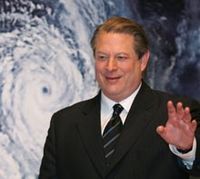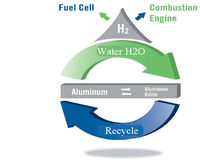Think of this as Volume 14, Number 37 of A-Clue.com, the online newsletter I've written since 1997. Enjoy.

In our time it's about energy coming from devices, as opposed to energy as resources. Resources have to be transformed by fire to become energy. Devices harness energy from the environment.
There is, in fact, plenty of energy all around us — as much as we could ever use. Coming down from the sky, flowing under the Earth, blowing across our land. What we need are devices that can harness it.
Meanwhile we have a Stupid Economy. It's stupid because there is an economic force stifling growth we feel powerless to get past, because that force seems to control our politics. In this case, it's energy billionaires like the Koch Brothers, the oil power, and to a lesser extent coal.
Look closely at who funds the Republican National Committee, all the "wingnut welfare" groups and Tea Party arcades. Follow the money where it doesn't want you to go and it's the same collection of names — energy men and their bankers.
But their economic time has passed. They can no longer deliver the prosperity they once did. They can only beggar our people as they have been doing for the last decade.
This is because resources have prices, prices that rise with demand. Every sign of economic growth in the last decade has been accompanied by a rise in energy prices. The only way to break the logjam and create real, sustainable economic growth is by harnessing the energy all around us, through devices.
But the resource industry does not want that. Thus they have captured our politics, not for ideological reasons (as they tell their allies), but to keep the power and subsidies that sustain them. Subsidies like wars in the oilpatch as well as tax credits that make it profitable to drill a mile under the Gulf, even at the risk of a catastrophic failure.
The cost of many devices, like solar cells, can actually fall as a function of Moore's Law. Even for those which don't, like windmills, they're a fixed, sunk cost. Upkeep is minor. Energy creation is as reliable as the energy source passing by them. Everything we can do to further energy as devices benefits the U.S. economy. Even the efforts of rivals like Germany and China benefit America — their devices put a break on energy prices, their knowledge is technology that can be sold and shared.
These logjams are never recognized during the crisis, and it's possible they're underestimated by historians even now:
- People in the early 1970s didn't understand how technology and the content of mens' minds would transform the economy to the detriment of basic manufacturing. They saw, they still see, only social changes coming from that era.
- People in the early 1930s didn't understand that demand was the key to steadily rising manufacturing consumption. Conservatives still see FDR's policies to stimulate demand as being "anti-buisiness" when they were necessary for business' prosperity. They made the middle class possible.
- People in the 1890s and 1900s didn't understand that capital needed to be controlled, and rates on basic inputs regulated, to create a national market with huge manufacturing capacity that could be operated for decades at a profit. They saw a battle between Progressives and Wall Street when in fact TR was working hand-in-glove with progressive businessmen.
- People in the 1850s didn't see the battle between North and South as one between machines and men. They saw slavery through a moral prism, either a necessity or pure evil. The battle had to be fought to unleash the power of invention and manufacturing on the economy.

They're up against the same thing that previous crisis Presidents were, regulatory capture by obsolete economic forces.
Al Gore's historical importance, it turns out, is not political, but economic. Gore, and the other backers of all the big alternative energy projects now coursing through universities and into small plants around the country, represent the future of our economy. They are the promise of unlimited energy, energy that is not tied to specific places over which we must maintain political control.
Energy in the future will not be the product of heating resources. It will be the product of intellectual energy, competitive manufacturing and careful planning. Gore's Global Warming debate hid this reality from us, turning economic progress into a political choice.
As a political choice, the new economy could be defeated (it still can be) by the political forces that control Washington.
It's their myths, their values, their assumptions that need to be directly challenged now, but they need to be challenged in a different way than Gore challenged them.

But here's the sad truth. At the end of the day it doesn't really matter what Obama does, or what America does. These economic forces are inexorable. Solar solutions are declining in price, they decline as demand increases thanks to manufacturing and Moore's Law efficiencies. Oil and coal will never again be able to say that.
So the nation that leads the way will lead the future. The times they are a changing, and those who stand in the way will be trampled.

China is recognizing this reality, because their dirty coal is strangling her people, so they're subsidizing green energy. Germany is recognizing this reality, because Europe lacks resources, so they're subsidizing green energy. If we want them to lead the future we can go along right as we've been going. They will bury us.
What makes the present time difficult for many Democrats is that they're missing the central question of our time, and so they're arguing over Nixon-era assumptions of conservative vs. liberal, the abusive marriage of the past. That's where Republicans want to have the argument.
It's time for a divorce. It's time for a new politics of growth, starting with a recognition that a real Green Energy bill is in fact a jobs bill, a transfer of subsidy from no-growth sectors to high-growth sectors, and that all payments from our government to private industry should be seen in that light.
If you're not growing you should get by on your own. If you are we need to invest in you, even if Wall Street doesn't yet see your potential. We've been doing this through our university system for a generation now. The Internet started as a military-funded research project called DARPA, in 1970. Research universities are our growth engines. Local politicians know this. Time for everyone else to understand the implications.

This is the story of America. It's a story of economic progress, not just political choice. The only reason we haven't made the right choice yet, the only reason Americans seem depressed entering the 2010 campaign, is because the choice hasn't been put before us.
There is still time for President Obama to do this. There is not time for us to let this moment pass, and return to it 4 or 8 or 10 years from now, while retaining our economic leadership.
That's why this election matters. It's not just the economy, stupid.
It's the stupid economy.











“There is still time for President Obama to do this”. Really? Can he do all that in 6 weeks?
What we need is more oil, cheap oil. Not expensive tax-subsidized technologies that nobody wants.
And I’m sure you’re already driving a hybrid, Dana? No? That’s of course Bush’s fault.
“There is still time for President Obama to do this”. Really? Can he do all that in 6 weeks?
What we need is more oil, cheap oil. Not expensive tax-subsidized technologies that nobody wants.
And I’m sure you’re already driving a hybrid, Dana? No? That’s of course Bush’s fault.
Hey Cindy, read the post more carefully this time since you missed the point altogether, and then ask BP where that “cheap oil” can be found. Your buddies Bush and Cheney told us the Iraq War would pay for itself in return for cheap and free oil we’d get. How’d that work out for ya?
Obama is captive to glacial government bureaucracy and to 19th century industries that will spend billions on wacko movements just to hang on to their last shred of profit. They’re telling you that you need to buy that big fat SUV (that Detroit is still making!). And while the green economy may be inexorable, Obama could do a much more decisive job of leading us to that economy. Corporations and banks got what they wanted at the expense of the middle class. The richest 2% want to borrow another $1.2 trillion from China to fund their own welfare tax cuts (but then they want more tax cuts so THEY don’t have to pay for their own welfare). And of course, the good old Defense Department insists on endless wars, again, that we’re borrowing money from the Chinese to pay for!
Without ending the wars — and that means everyone out of Iraq and Afghanistan — Obama lacks credibility on any other issue. He has neither the will nor the courage to do it. He’ll drag it out long enough to leave it to the next guy, and then the next, and as I’ve said before, in 2020 we’ll still be in both countries. At least he got to play the part of President for four years and he got a lot of rounds of golf in. Maybe he’ll include his golf scores and vacation photos in his memoirs.
Hey Cindy, read the post more carefully this time since you missed the point altogether, and then ask BP where that “cheap oil” can be found. Your buddies Bush and Cheney told us the Iraq War would pay for itself in return for cheap and free oil we’d get. How’d that work out for ya?
Obama is captive to glacial government bureaucracy and to 19th century industries that will spend billions on wacko movements just to hang on to their last shred of profit. They’re telling you that you need to buy that big fat SUV (that Detroit is still making!). And while the green economy may be inexorable, Obama could do a much more decisive job of leading us to that economy. Corporations and banks got what they wanted at the expense of the middle class. The richest 2% want to borrow another $1.2 trillion from China to fund their own welfare tax cuts (but then they want more tax cuts so THEY don’t have to pay for their own welfare). And of course, the good old Defense Department insists on endless wars, again, that we’re borrowing money from the Chinese to pay for!
Without ending the wars — and that means everyone out of Iraq and Afghanistan — Obama lacks credibility on any other issue. He has neither the will nor the courage to do it. He’ll drag it out long enough to leave it to the next guy, and then the next, and as I’ve said before, in 2020 we’ll still be in both countries. At least he got to play the part of President for four years and he got a lot of rounds of golf in. Maybe he’ll include his golf scores and vacation photos in his memoirs.
I really feel sorry for you. Your view represents hopelessness disguised as "realism."
But you do represent the extreme of the other side in your comments very well. So I thank you for that.
We have a choice. We can go your way, toward war and death, or we can go another way.
I choose some way other than eternal wars for our children, and strangulation for our planet. I choose technology and hope.
I think most Americans feel that way. It's how we beat the Soviet Union. Your e-mail address indicates you're from Russia. Assuming that's the case, now you know why your side lost the Cold War. You couldn't adapt to change the way a free people can.
Dana
I really feel sorry for you. Your view represents hopelessness disguised as "realism."
But you do represent the extreme of the other side in your comments very well. So I thank you for that.
We have a choice. We can go your way, toward war and death, or we can go another way.
I choose some way other than eternal wars for our children, and strangulation for our planet. I choose technology and hope.
I think most Americans feel that way. It's how we beat the Soviet Union. Your e-mail address indicates you're from Russia. Assuming that's the case, now you know why your side lost the Cold War. You couldn't adapt to change the way a free people can.
Dana
Don't underestimate this President, and don't underestimate America.
It is very, very difficult to change a set of myths, values and assumptions that have become ingrained in the soul of a bureaucracy. Especially one with thousands of nuclear weapons and hundreds of thousands of armed men at its disposal.
Combat in Iraq is winding down. Combat in Afghanistan will, too. The President ran for office determined to make a stand there, and he has. Al Qaeda was not in Iraq. It is in Afghanistan, and in Pakistan. It is degraded further every month we're there. But leaving Pakistan, with its nuclear weapons, in the hands of Al Qaeda just is not a viable option at this time. We have to find a way forward which precludes that, and that is what we're working to do.
Bush left this nation and this world in a helluva mess. Expecting it to all be fixed in less than two years is ridiculous.
Remember that in 1862 many in the North felt the Civil War was lost, and in 1934 many, many Americans felt the same way about our democratic system. The current crisis is just as intractable as those. There is no pony and no magic wand. There is only hard struggle, and seeing it through. That's what history teaches us.
Dana
Don't underestimate this President, and don't underestimate America.
It is very, very difficult to change a set of myths, values and assumptions that have become ingrained in the soul of a bureaucracy. Especially one with thousands of nuclear weapons and hundreds of thousands of armed men at its disposal.
Combat in Iraq is winding down. Combat in Afghanistan will, too. The President ran for office determined to make a stand there, and he has. Al Qaeda was not in Iraq. It is in Afghanistan, and in Pakistan. It is degraded further every month we're there. But leaving Pakistan, with its nuclear weapons, in the hands of Al Qaeda just is not a viable option at this time. We have to find a way forward which precludes that, and that is what we're working to do.
Bush left this nation and this world in a helluva mess. Expecting it to all be fixed in less than two years is ridiculous.
Remember that in 1862 many in the North felt the Civil War was lost, and in 1934 many, many Americans felt the same way about our democratic system. The current crisis is just as intractable as those. There is no pony and no magic wand. There is only hard struggle, and seeing it through. That's what history teaches us.
Dana
Ahh that was missing, still blaming Bush!
You guys really need to lighten up. Reading the blogs and posts I get the impression that being a liberal is no fun. All that whining and blaming, even demonizing when you can’t get your way sometimes.
By the way Dana, you didn’t address Cindy’s remark that you are a hypocrite. That’s because you are a hypocrite.
@Zaine: Good reaction. My take is that Obama has already reconciled himself to the fact that he’s a one-termer, having realized that to be a president, one really needs a spine. And the fact is that The One simply doesn’t have a spine. He can’t even speak one sentence without stuttering if he doesn’t have a teleprompter in front of his face. Maybe he has trouble with the English language. Who knows…Maybe his thoughts are constantly with other things, like sucking up the arse of muslim causes, or finding ways to get that vomit mosque on/near ground zero. I don’t know. He simply looks more and more tired – uninspiring – as time goes by. To sum it up: he seems like an uninspired weak puppet. He won’t get anything done. Most liberals have woken up to that reality. There are some diehards left (like our Dana here), but eventually they’ll see it as well. It just takes some time. We need to be gentle with them.
Ahh that was missing, still blaming Bush!
You guys really need to lighten up. Reading the blogs and posts I get the impression that being a liberal is no fun. All that whining and blaming, even demonizing when you can’t get your way sometimes.
By the way Dana, you didn’t address Cindy’s remark that you are a hypocrite. That’s because you are a hypocrite.
@Zaine: Good reaction. My take is that Obama has already reconciled himself to the fact that he’s a one-termer, having realized that to be a president, one really needs a spine. And the fact is that The One simply doesn’t have a spine. He can’t even speak one sentence without stuttering if he doesn’t have a teleprompter in front of his face. Maybe he has trouble with the English language. Who knows…Maybe his thoughts are constantly with other things, like sucking up the arse of muslim causes, or finding ways to get that vomit mosque on/near ground zero. I don’t know. He simply looks more and more tired – uninspiring – as time goes by. To sum it up: he seems like an uninspired weak puppet. He won’t get anything done. Most liberals have woken up to that reality. There are some diehards left (like our Dana here), but eventually they’ll see it as well. It just takes some time. We need to be gentle with them.